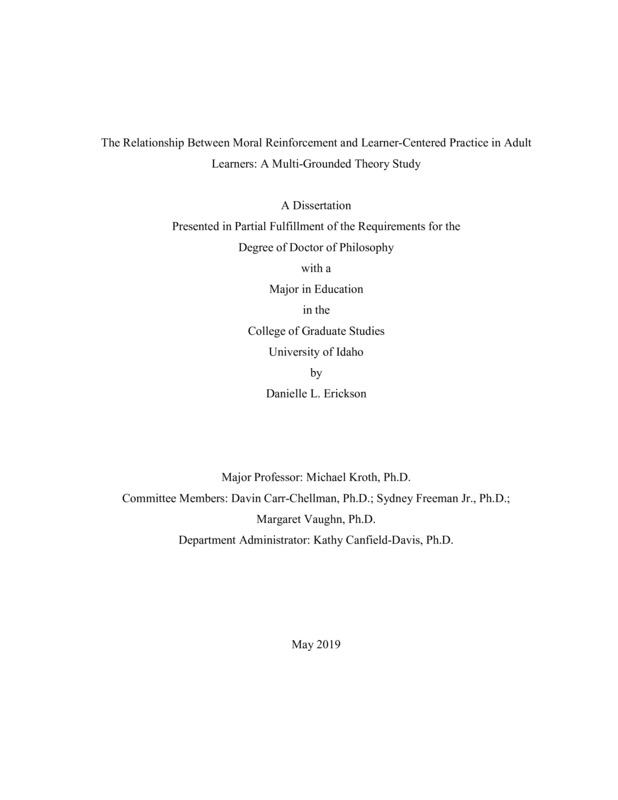The Relationship Between Moral Reinforcement and Learner-Centered Practice in Adult Learners: A Multi-Grounded Theory Study
Erickson, Danielle Louise. (2019-05). The Relationship Between Moral Reinforcement and Learner-Centered Practice in Adult Learners: A Multi-Grounded Theory Study. Theses and Dissertations Collection, University of Idaho Library Digital Collections. https://www.lib.uidaho.edu/digital/etd/items/erickson_idaho_0089e_11507.html
- Title:
- The Relationship Between Moral Reinforcement and Learner-Centered Practice in Adult Learners: A Multi-Grounded Theory Study
- Author:
- Erickson, Danielle Louise
- Date:
- 2019-05
- Keywords:
- Adult Learning Higher Education Learner-Centered Practice Moral Development Moral Reasoning Multi-Grounded Theory
- Program:
- Leadership and Counseling
- Subject Category:
- Adult education; Education; Higher education
- Abstract:
-
Moral development is a significant issue in education, yet there is no concrete understanding of how moral learning and moral reasoning are integrated into higher education institutions, especially without a religious connotation. This study aimed to explore the relationship between learner-centered practice, moral development, and moral reasoning within adult learners in higher education institutions. This grounded theory study intended to provide insight into the moral reflections, experiences, and perceptions of adult learners in the context of learner-centered practice. Thirteen adult learners from four research settings participated in this study. The research settings were observed using an observational protocol to ensure that they were learner-centered. In-depth phone interviews were the main source of data collection; participants were interviewed two to three times each. Through methods of coding, constant comparative analysis, memoing, and explicit grounding processes, five overarching themes emerged from the data: intentionality, reflective processes, community of learning, perspective scaffolding, and moral reinforcement. These themes contributed to the emergence of a grounded theory: the theoretical model for moral reinforcement in learner-centered practice. Theoretical matching was used to compare the emergent theory with existing frameworks, which included research on learner-centered practice, morality of instruction and learning, andragogy, cognitivism and constructivism, and moral development theory. This study offers one interpretation of the findings, namely, that moral reinforcement is a possible outcome for adult learners in learner-centered practice. According to participants, moral reinforcement was a result of personal motivation and effort, reflection and consideration, peer collaboration and support, and perspective scaffolding. The findings fill a gap in current literature by describing the relationship of moral development, moral reasoning, and learner-centered practice in the context of adult learners. A better understanding of how learner-centered practice contributes to a learner’s moral development and moral reasoning has implications for lifelong learners and their learning, educators and their curriculum design, and higher education institutions attempting to meet society’s expectations to create a nation of learners.
- Description:
- doctoral, Ph.D., Leadership and Counseling -- University of Idaho - College of Graduate Studies, 2019-05
- Major Professor:
- Kroth, Michael
- Committee:
- Carr-Chellman, Davin; Freeman Jr., Sydney; Vaughn, Margaret
- Defense Date:
- 2019-05
- Identifier:
- Erickson_idaho_0089E_11507
- Type:
- Text
- Format Original:
- Format:
- application/pdf
- Rights:
- In Copyright - Educational Use Permitted. For more information, please contact University of Idaho Library Special Collections and Archives Department at libspec@uidaho.edu.
- Standardized Rights:
- http://rightsstatements.org/vocab/InC-EDU/1.0/

